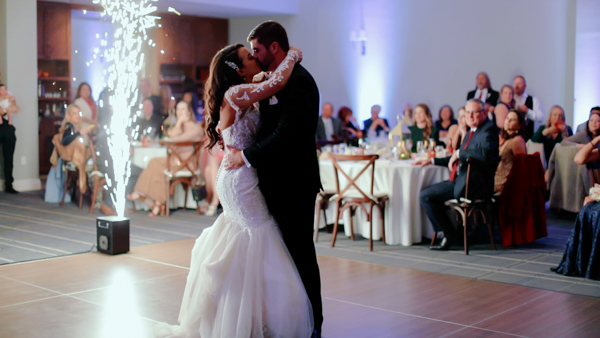As a wedding videographer, I’ve had the pleasure of experiencing so many different
This post may contain affiliate links, which means I’ll receive a commission if you purchase through my links, at no extra cost to you. Please read full disclosure for more information.
As my experience grew, I realized there is a certain expectation I can have if the wedding ceremony itself falls into a particular category.
I can expect a certain timeframe to be prepared for, changes in schedule, and even the couple’s personality. While this is not always the case, it has struck me that most weddings can fall into one of five general categories.
So without further ado, let’s discuss these different types of wedding ceremonies and leave you with greater knowledge on their characteristics.
5 Most Common Types of Wedding Ceremonies
Religious Weddings

The first and biggest ceremony category, in my opinion, are the religious ceremonies.
This type is extremely broad because there are so many different religions in our world today.
And depending on the type of religion, you could have a rather lengthy ceremony versus a short ceremony.
Those who are Roman Catholics, for example and are having a Catholic ceremony usually have a lengthy ceremony. If it’s planned in the traditional style, it will include communion and a full Mass, and that could be anywhere from 50 minutes to an hour in duration.
Jewish weddings too, also seem to fall into the category of being on the longer side. These could last up to 45 minutes in length of the ceremony itself.
Prior to the ceremony, Jewish traditions of the wedding day can be incorporated such as the tradition of kabbalat panim. This is where the bride and groom are greeted by the wedding party, family and close friends. The signing of the wedding documents and marriage contract takes place during this time, which is known as the ketubah.

One tradition you may be somewhat familiar with is the lifting of the newlyweds into the air during the wedding reception. The actual term for this is the hora and this is traditionally done after the ceremony.
All of these aspects of the Jewish wedding add to the length of the wedding making it longer than your usual weddings.
But I digress.
Back to religious wedding ceremonies in general.
A religious ceremony is commonly held in a place of worship or includes elements of a religious service. This means having a religious leader be the officiant, incorporating worship songs and even prayer into the ceremony.
Many times the focus is to make sure that at the very least, the couple’s spiritual beliefs are incorporated into the wedding ceremony.
There is also a non-denominational ceremony in which the wedding couple may not consider themselves to fall into a certain type of denomination.
This type of ceremony will avoid a reference to any particular faith or the significance of one religion over another. The wedding couple may identify as “Christian” but not link themselves to one particular faith such as Methodist, Catholic, etc.
Religious references can be incorporated but certain religious practices and traditions typically are not in this type of wedding ceremony.
Within this same category is what I would argue are the non-religious ceremonies.
This can also be known as a secular ceremony, in which the couple truly does things their way. This means doing a non-traditional, non-religious type of ceremony.
The couple’s personal style is greatly emphasized and can vary from personality to personality. This can range from an extreme of an informal wedding to a double wedding. The possibilities are endless.
What is consistent is avoiding any reference to religious traditions of any kind and any religious aspects within the ceremony.
Civil Ceremonies
A civil ceremony on the other hand, is that of a legal marriage ceremony that is not religious. A legal officiant such as a justice of the peace or court clerk, as opposed to a religious officiant presides over this type of ceremony.
All the legal requirements of a marital ceremony are fulfilled in a city hall (or courthouse), town hall, registry office or even a county clerk’s office.
Civil weddings are for those wanting to keep things super simple. Short, sweet and to the point. Typically exchange of vows and other aspects of a religious ceremony or traditional wedding ceremony will be absent, like a unity candle or handing off of the bride by the father of the bride.
But since these are so small and intimate, you can really do whatever you want.
I had the opportunity to film a civil wedding and the couple walked down the short center aisle together, said personal wedding vows and did a ring exchange. Even though it was simple, it still incorporated all the elements that they wanted from a traditional wedding.
The take-away point is regardless of what type of ceremony it is, it’s still YOUR big day and you can do it the way you feel best.
Elopement Ceremonies
Elopement ceremonies used to be spontaneous and secretive.
Crazy how time has changed things. The definition has definitely expanded.
Now it can be just as normal for an elopement wedding to be more planned and not as secretive versus the former.
Elopement ceremonies are usually those that happen away from a couple’s home. Many times before an elopement wedding was associated with secrecy and having no family or friends around or aware of the special day.
Nowadays, family and friends may be aware and even a precious few invited.
Destination Weddings
This is a fun one but likely an expensive one as well since destination weddings are usually associated with being held in a foreign country.
Again, this definition has definitely changed as well as it can simply be in another part of the United States or just a truly unique location or circumstance like a cruise wedding.
A great first step is to connect with wedding planners who have experience with destination weddings.
You’ll need to make sure you’re aware of the different requirements and marriage laws in a destination wedding location other than your usual home.
Having someone to guide you with the planning will be essential in making this a feasible opportunity for family and friends to join you on your special day since travel, financial and other life accommodations will need to be taken into account.
Humanist Weddings
This is an interesting category since it is not really known here in the United States.
Humanist weddings are legally recognized in some United Kingdom countries. But not in every place. And as of 2021, humanist ceremonies are now legally binding here in the United States.
These are not religious wedding ceremonies though they may incorporate wedding rings being exchanged or even wedding vows.
The focus is to be inclusive but personally tailored to the couple. Traditional rules and expectations of a usual ceremony are thrown out the window including adherence to the traditions of a specific religion or any religion at all.
The wedding couple is given free rein to marry where, when and how they desire. For those who are free spirits, independent-minded and without any care for the usual traditions, this is probably your type of wedding to shoot for.
I must say, I haven’t really experienced a wedding that falls in this category. Not yet anyway.
In short,
The categories of wedding ceremonies are very broad.

They can incorporate a range of overlapping characteristics depending on the couple’s preference.
For example, religious wedding ceremonies may actually also be an interfaith ceremony in which the bride and groom’s individual faiths are recognized together.
A destination wedding or even elopement ceremony could be held on cruise ships. I mean, with a ceremony like this you can look at saving on costs with your wedding budget. You get your wedding and honeymoon simultaneously.
There are even commitment ceremonies which is like a wedding ceremony, likely a really intimate one, but isn’t legally binding. The couple doesn’t prioritize making sure their wedding is legally binding according to government standards but they do make a commitment to each other as if it were.
Honestly, the possibilities are endless. I’ve seen it all.
From a civil wedding that was short and sweet with a long photo and video session with a celebratory reception party 6 months to a year later to an Air B&B wedding. From the traditional ivory wedding dress to a black wedding dress to a pink one. From a ceremony in a bride’s private home to the fancy all inconclusive wedding and reception venue.
Shall I continue?
From themed weddings to traditional marriage ceremonies, you can have whatever you want nowadays. As long as you’re happy, chances are your loved ones, family members, friends, are going to support you.
My advice for a great starting point in any of these directions is to speak with an established wedding planner. This is a necessity if you’re wanting to make sure you have the best stress-free wedding planning experience for you and your betrothed.
*See my vendor recommendations list for the Wedding Planner I recommend here in San Antonio, Texas. Nikki Olivares is amazing and has affordable options as well.
Just definitely talk to someone who plans and organizes weddings and can help you think of all the options at your disposal.
As a wedding videographer who’s seen a variety of weddings, I can honestly say each wedding is truly unique.
The most important factor is your happiness with what you have planned. Don’t do or leave out anything you will look back on and regret.
The goal is to do it once and regardless of if everything is perfect or not, as long as it is what you envisioned it to be and a day you loved, it will be worth it.

